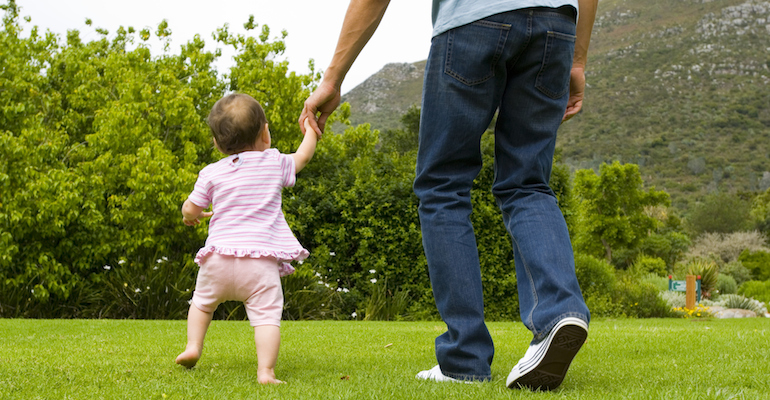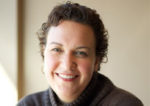Many years ago, my wife and I reached a crossroad in our quest to become parents. Stephanie, a teacher, and I, a utility worker, had to choose between reaching for the top rung of the fertility ladder or taking a different path, adoption.
Stalling the best I could, I was able to defer the choice until early summer, after a long planned family vacation. June came, the vacation went, and the period of contemplation left us both thinking adoption was best. I left for work the next morning, happy with our choice but wondering, where do we go from here?
When I returned home that evening, my question was answered. My wife had every adoption book from our local library scattered on the living room floor. We spent July reading and discussing, thinking, praying, and hoping. We took notes and talked. We laughed and cried. Above all, we learned.
Although it seems like yesterday, it was years ago. As I write this, our beautiful daughter, Natalie Faith, slumbers. I have a different perspective on adoption now. I think the books had merit. They helped us to understand the different types of adoption. They covered the laws, what to expect from agencies, the average wait times for an infant, and the average expenses. But for all they offered, some things weren’t covered, so I want to share my newfound expertise.
It is better for people to think you an idiot than to open your mouth and remove all doubt. Waiting for your child or being a parent to an adopted child sometimes spawns questions or comments that are somewhat reflective of this old saying. It really starts when you tell people you are adopting.
Everyone knew we were in the process because we told them, via a mass mailing. (We did this in case someone knew someone who could help us.) But as we waited, we were asked many questions. “How is the adoption going?” “Have you heard anything?” “How much longer?” These are sensitive probes in an emotional time. Books mentioned that there would be such comments but never talked about how they would make us feel.
The pre-placement questions were discreet compared to the post-adoption comments we have heard. The one that wins the idiot prize referred to my daughter’s darker-toned skin. We were asked, “Is she part something else?”
My wife replied, “No, she’s all human.” I have become intensely protective of my daughter, so such statements yank my heartstrings. If books offered advice on coping with things people say, it should read, “Most people ask because they care or are trying to make conversation. Those not in this category are idiots.”
Like it or not, each child comes with a birth mom. The books we read did nothing to prepare us for the reality of birth moms. Books centered on how to find a birth mom and what to talk about once one was located.
As we began a domestic independent adoption, I envisioned a sensible 16-year-old high school homecoming queen finding herself accidentally pregnant by the quarterback. She, of course, wants to place the child so she can accept her scholarship to an Ivy League school as a pre-med major. This scenario is what I wanted. I was afraid of other, riskier situations.
I have had relationships with two birth moms now (our first situation fell through), and there are remarkable similarities between them. Both were from abusive homes. Both had been through the court system as juveniles. Drug and alcohol issues affected their families as well as them. Both were from poor homes.
I know I can’t generalize too much, but I think these women were more typical than was the homecoming queen in my dream. These realities were hard to swallow; they scared me to death. I spent endless time worrying about genetics versus environment. I worried about the child’s health. The burden was so heavy that I visited a counselor and a priest.
There is one more thing the mothers had in common, and that is love. Each birth mom loved her baby immeasurably. The first expressed her love by choosing to parent her child. The second, our birth mom, told us repeatedly that she did not want Natalie to think that she was “bad” for not raising her. She wanted her to know that she loved her and wanted to raise her. But she knew what kind of life that meant for a child, and she didn’t want that for her baby.
The greener grass and faith… There is no larger part to the adoption story than faith, and not one book talked about it. From the beginning of our road to parenthood, we have attended a local adoptive parents group. Whether a couple is anguishing in the waiting stage or is raising three beautiful children, in either case we often hear faith-filled statements. “God has a plan for us.” “Our baby will be with us soon.” “Our son was meant for our family.”
I relied on faith through this process. I was often scared. I thought of stopping, but I kept telling myself, this will be all right. God wouldn’t give me more than I could handle.
As I struggled with the challenges, I was tested to an even greater degree. Four weeks prior to our daughter’s birth, we received a call from an attorney saying that we had been matched with another birth mom. It was almost exactly my dream situation — she was 16, pregnant by her high school sweetheart.
It seemed so simple, where our current situation seemed so complicated. My first reaction was, “Thank God!” However, after thinking and praying about it, the next night we decided that our current situation was best for us. As scared as I was, and as risky as this seemed to be, I felt calm. So we passed up an “ideal” situation. I have never regretted our decision because it enabled me to meet my daughter. Faith — it is her middle name and the backbone of adoption.
If you save one life, you save the world in time. This Jewish proverb speaks to the last item not mentioned in the books, and that is the baby. The books talk about the means to get the infant, but not about him or her. The books never told me how soft my baby’s cheeks would be and how warm they would feel when I press them to mine.
Books never described the glow in her eyes as she smiles at me. No one ever said how much we would laugh and giggle with her over things like feeding her sweet potatoes. The books didn’t tell us we would dash to her room in the evenings just to watch her sleep. The books didn’t talk about it, so I will.
I never imagined the joy of being a father. It is the best experience I have ever had, and I live it every day. “Adoption versus biological” doesn’t cross my mind. She is my daughter, period. Many people have told my wife and I that our daughter is lucky to have us, that we are doing a good thing. Really, it is Natalie that has saved us. I think all parents with adopted children would say the same.






